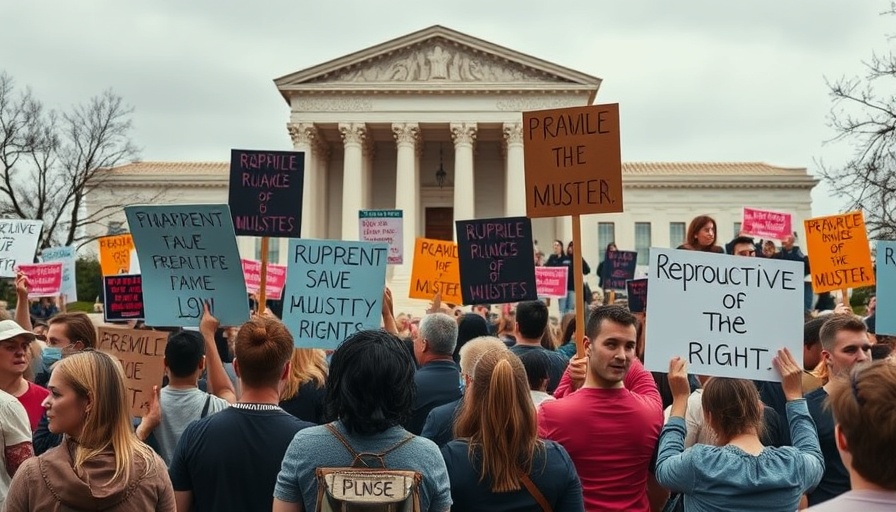
The Supreme Court's Split: A Crucial Moment for Healthcare Access
The U.S. Supreme Court faced a critical decision on April 2, 2025, as justices deliberated on whether states can deny Medicaid funding to Planned Parenthood. This case not only threatens the availability of healthcare services for low-income patients but also raises profound questions about personal health choices and state authority. The opposing views presented in court reflect wider societal divides over reproductive health and federal funding for abortion services.
What’s at Stake for Patients?
For numerous low-income individuals relying on Planned Parenthood, the implications of this case are dire. Nationwide, the organization provides essential services, including cancer screenings, contraception, and pregnancy testing. A ruling that allows states to cut funding could devastate access to these services, compelling patients to seek care elsewhere, often at a greater financial and logistical cost.
Justice Amy Coney Barrett raised significant concerns regarding the potential fallout of incentivizing states to restrict services negatively impacting vulnerable populations. With the possibility of losing access to their chosen healthcare provider, many patients could be left with fewer options, potentially compromising their health outcomes.
Following the Money: Understanding the Legal Arguments
The crux of the Supreme Court arguments centers on the right of Medicaid patients to choose their healthcare providers. South Carolina leaders argue that prohibiting lawsuits over funding cuts could relieve the state of financial burdens from legal fees, promoting a more efficient allocation of public resources. Justice Brett Kavanaugh pointed out an apparent need for clarity on the matter, suggesting that obtaining a definitive ruling could help mitigate confusion experienced by lower courts.
Conversely, attorney Kyle Hawkins, representing the Trump administration, shifted positions post-election towards supporting South Carolina’s stance while emphasizing fiscal responsibility. However, Justice Elena Kagan challenged the rationale behind potentially hindering patients' legal recourse, suggesting this could significantly alter established rights and protections.
Rallying for Reproductive Rights: The Community Response
Outside the Supreme Court, a multitude of activists gathered on both sides of the polarizing issue, illustrating the profound societal divide regarding access to reproductive health services. Abortion-rights advocates contend that the ability to choose one’s healthcare provider is an intensely personal decision, warranting legislative protection. Planned Parenthood's perspective, backed by Kagan's remarks, emphasizes that eliminating the right to sue would essentially redefine patient rights in potentially undesirable ways.
This ongoing debate resonates fiercely within communities across America, particularly in places like Davenport, Polk County, where many residents may directly feel the impacts of such political decisions. As healthcare accessibility becomes intertwined with socio-political identity, the rallies outside the court hall emphasize how passionate advocacy and community voices are shaping health policy discussions.
Future Implications for Healthcare Funding and Access
The implications of this Supreme Court ruling extend beyond the immediate case as potential shifts in Medicaid funding policies could reverberate through public health systems nationwide. A decision in favor of state funding cuts could embolden conservative states to impose stricter regulations on healthcare providers, possibly reversing decades of progress in reproductive rights and health access.
Conversely, a ruling favoring Planned Parenthood may fortify protections for healthcare access and patient choice, ensuring that low-income individuals retain their rights to choose qualified providers without financial overreach from politically motivated state actions.
What Can Residents Do?
As the debate over reproductive health and state funding unfolds, residents and community members in areas like Polk County have a pivotal role. Engaging in local discussions, advocating for health rights, and supporting organizations that provide essential health services are ways individuals can contribute to the broader conversation surrounding this issue. The importance of understanding personal healthcare rights and advocating for access cannot be overstated.
Remaining informed on policy changes and supporting pro-access initiatives will be crucial for residents ensuring their health choices remain protected amid shifting political climates.
This court case highlights not only the individual choices regarding health access but also serves as a vital reminder about the collective responsibility of communities to take an active role in shaping healthcare policies that reflect their values. Keeping abreast of court decisions and community advocacy will empower individuals to make informed decisions about their health and wellbeing.
Conclusion: A Call for Informed Advocacy
As the Supreme Court deliberates on this critical issue, it's essential for community members in Davenport and beyond to remain engaged, informed, and alert to potential changes in health policy that could affect personal rights and healthcare access. Advocacy starts at the local level, and by participating in these discussions, you play a crucial role in advocating for choice and access in healthcare.
 Add Row
Add Row  Add
Add 






Write A Comment